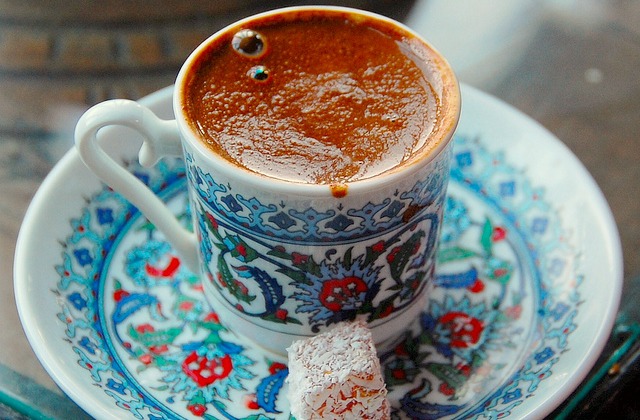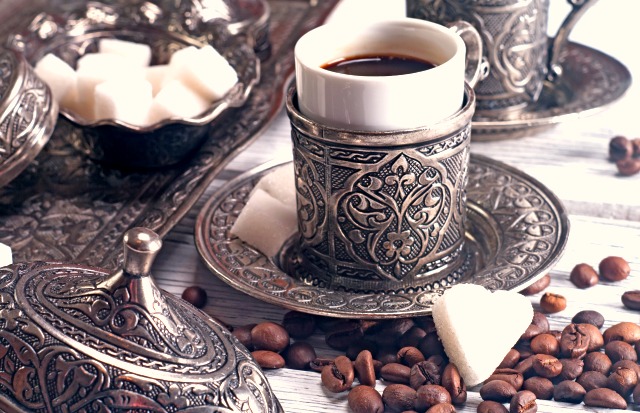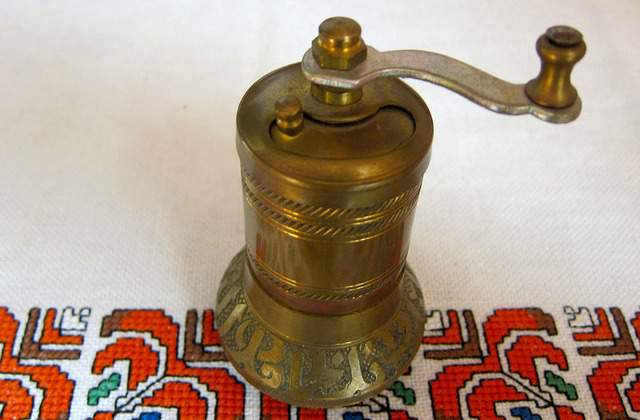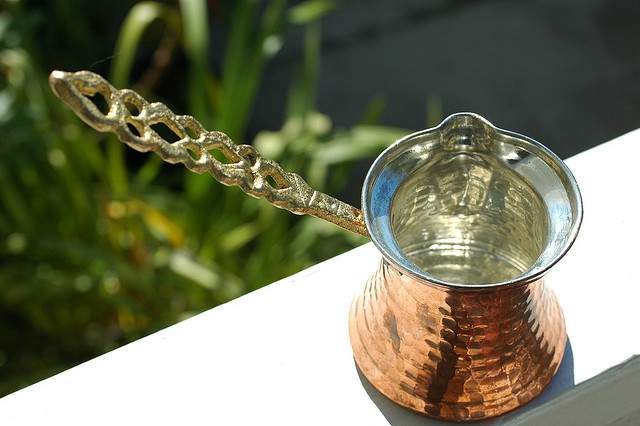[Home] › [Food] › [Coffee]
Amazing turkish coffee
Recipe & Tips
Turkish coffee was a drink for the wealthy in the 15th century. Ottoman Sultans first tried coffee in 1450s when merchants brought the beans found in Ethiopia to the Ottoman Empire through Yemen. Later, mastic flavoring called "Yemen gum" was added to the coffee. Today this mastic-flavored type of coffee is known as "damlasakizli kahve" and is specific to Turkey.
Quickly coffee ceremonies emerged, Turkish coffee benefits were being discussed. Only wealthy could afford the “magic fruit”. Sultan always carried sack of coffee beans on his trips.
In 1683 the Battle of Vienna took place where Ottoman Empire invaded the imperial city of Vienna. The Ottomans were loosing and left the battle fields in a hurry deserting sacks of coffee at the gates of Vienna. This is how Europe got its coffee.
UNESCO “Non-Material Heritage” added coffee culture and tradition in Turkey to its list in 2013.
Classic Turkish coffee recipe
 Foamy coffee with Turkish delight
Foamy coffee with Turkish delightWith very little variation the question of how to make Turkish coffee is usually answered the same way:
- Fry your green coffee beans (unless you already bought your beans fried).
- Let the beans cool (if applicable).
- Put the coffee beans on top part of the grinder and start turning the handle. Smell the wonderful freshly ground coffee aroma from the bottom part of the grinder (depo in Turkish).
- Put the ground beans into your cezve. Use 1 x 1 proportion. 1 teaspoon of ground coffee for 1 Turkish coffee cup.
- Pour cold water into the cezve. Measure your water with the coffee cup. One cup - one portion. Two cups - two portions.
- Put the coffee pot on low heat and wait until coffee foam starts coming up.
- Turn off the heat as soon as you see the foam.
Tips on how to make the best Turkish coffee
- Keep your coffee on stove until almost boiled. The aroma is the best when you stay by the cezve at all times and make sure to turn off the heat at the right moment.
- Let the water and the coffee blend on their own. Do not stir.
- Pour your coffee into cups right after preparing, while hot.
- Save milk for other drinks. Turkish coffee does not take milk.
- It may be served with or without a sweet or sugar cube or Turkish delight - called "lokum".
- A cup of water usually accompanies the coffee.
- Some put a little sugar in the coffee while cooking ("az sekerli kahve" in Turkish).
- Some put more sugar ("orta kahve").
- Very sweet coffee is "sekerli kahve".
- Coffee prepared with no sugar is called "sa-de kahve".
Besides the amazing aroma that coffee acquires through the certain cooking technique, there is a type of coffee specific to Aegean region of Turkey called "damlasakizli". Damlasakizi is a natural flavoring obtained from the mastic tree. The flavor is very popular in Turkey and is added to sweets, ice-cream and coffee. Go for a cup of damlasakizli coffee to experience the regional taste.
Coffee cups
(Turk kahvesi fincani in Turkish)

Turkish cups for coffee are tiny porcelain vessels with a handle. Served with a small saucer, the sets are usually designed in the Turkish-Islamic style. Porcelain used for the sets comes from Iznik and Kutahya - the largest ceramics production cities in Turkey.
The metallic case, usually made of copper, is used for keeping the coffee hot for as long as possible.
Check out “Coffee break” collection at Pera Museum with Turkish cups and the history of coffee tradition in Turkey.
How to drink Turkish coffee
Slowly savor your three-four sips of coffee that fit in the tiny coffee cups. Take your time. Coffee is a social drink. Indulge in the conversation you are having and make a small sip every now and then.
A little piece of cube sugar or Turkish delight usually accompany coffee in Turkey if you ordered it "sa-de", i.e. cooked without sugar. See if you can stay out of sweets to experience the amazing coffee aroma fully.
Remember that the coffee grounds on the bottom of the cup have a bitter taste and are not for drinking.
The coffee grounds can be used for fortune telling, for scrubbing your face and body or even fertilizing home flowers!
Turkish coffee benefits
Coffee benefits have been a subject of debate for centuries. Researchers finally agreed on a list of good from drinking coffee (see below). The condition for benefiting from the drink is to consume it without milk and sugar. Generally it is advised to enjoy no more than one or two cups per day to "qualify" for the benefits:
- Lower risk of cancer
- Lower risk of type 2 diabetes
- Lower risk of premature death
- Easy fat burner
- Reduced fatty liver
This article discusses in detail the above benefits of drinking coffee and provides some background data.
What you do get for sure from drinking coffee is unbeatable pleasure. Enjoy your drink and stay healthy!
Coffee grinder
(Kahve degirmeni in Turkish)
 By Ali Eminov
By Ali EminovTraditionally Turks have been grinding their coffee in a manual hand grinder. Every household had a manual grinder. With time automatic coffee grinders and pre-ground beans from stores have replaced the manual grinders yet true coffee gourmets still use the old-style grinders.
Grinder tips
- Grind just enough for the amount of coffee you are making.
- Grinders are made of what is called the industrial iron. The color of the iron is usually yellow. It is confused and mistakenly taken for copper.
- The grinder consists of two parts. Take them apart. Pay attention to the color inside and outside of the the grinder. Make sure the color is the same on both sides. It means your hand grinder is made of healthy industrial iron.
- Notice different colors on the inside and outside of grinder parts. The product is probably made of aluminium, then painted into yellow or iron color. Such grinders may be harmful for health.
- Any coffee of any origin can be prepared the Turkish way. There is no such a thing as Turkish coffee beans.
Coffee pot
(Cezve in Turkish)
 Copper cezve. Phto By Flickred!
Copper cezve. Phto By Flickred!Turkish coffee pot is a vessel which comes in different sizes with a long handle. It is known as ibrik, turka or jazva in different countries. The pot can be made of copper, brass, stainless steel, aluminium or even ceramics, silver and gold.
Notice a little brim, modern cezves have two brims, for easy pouring your coffee into a cup. The long handle prevents arms from burning. It may be made of wood, silicon or same material as the cezve itself.
Cezve is heated on coals (usually at historical coffee shops) or on top stove (at home). Today modern electrical coffee makers gain popularity but nothing beats the taste of a coffee prepared in a cezve on coals.
In poetry
... Delicious sip can’t live without it
Deep dark mystery captivates
It lifts me up awakes my senses
Stimulates and fascinates ...
Full version of Bitter Sweet As Turkish Coffee poem by Sandra
Bon apetit. Enjoy your drink. (Afiyet olsun in Turkish).
